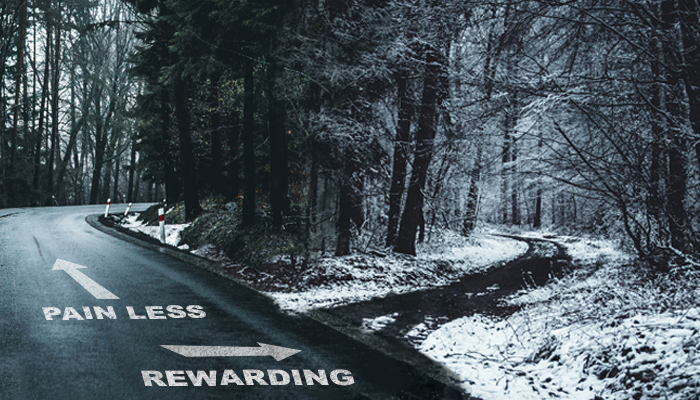To Suffer Willingly
I want to want to suffer more.
I want to want the painful cramps, the blistering headaches and the tearful exhaustion. I want to want the hair-pulling frustration, the desperate pleas for help, the nail-biting anxiety of uncertainty.
I want to want it so badly. But in all honesty, I don’t.
Because when I start to remember all the times that I walked through the valley of sorrow, my heart aches and I cringe. I remember my anguish with such vividness, that it seems as though a day hasn’t gone by.
I can almost hear my voice tremble in prayer, begging the Lord to take away the pain, to change the situation; to give me some kind of hope.
Often, it seemed like the pain would never subside. And yet, it did.
Remembering the “After”
I see that after the hours of early morning, sweat-driven workouts, I had the joy of starting on a volleyball team made up of girls three years older than I. And I remember the rush that came from nailing the ball right on the floor, scoring us the winning point.
I see that after many hair-pulling scripture studies seeking revelation for a struggling investigator, there came a moment where heaven would draw near. Then, in their small, heat-filled living room, their face would light up, and tears filled their eyes, as the Spirit confirmed truth.
I see that after several despairing nights in my bedroom, I received an unexpected kind gesture from a stranger that implied, You are not forgotten. Laughter then filled the room as new-found friends united with me only one floor beneath where I had once cried out for comfort.

You see, I believe that it is only after the moments of awful pain, that little by little, there is a light that breaks through. The darkness of sorrow and pain is replaced by the light of joy and peace.
But they are not one without the other. There is no joy without pain, and no pain without relief.
So, in the moments where my heart longs to rejoice, I start to think, I want to suffer. For how can I arrive at joy without first passing for sorrow?
And yet, even in understanding this, I falter and I ask, Why don’t I actually want it?
Where Joy Resides
Why is it that still, after all these years of experience, I hesitate to pass through the valley of sorrow?
Perhaps, it is because I am hesitant to feel something so deep again. Or perhaps, I fear that this time, it may be worse.
Perhaps I wonder how long the suffering will last. Or perhaps, I wonder if this time, I will be able to last.
But maybe my hesitancy is for the better. My hesitancy may lead me to more seriously study my scriptures the moment that things seem to be difficult, rather than months after. It may remind me to pray with real intent, now, in gratitude, rather than when I’m begging for help.
My woeful memories may just be the reason I learn from my suffering.

Anne Morrow Lindbergh once said, “I do not believe that sheer suffering teaches. If suffering alone taught, all the world would be wise, since everyone suffers. To suffering must be added mourning, understanding, patience, love, openness, and the willingness to remain vulnerable.”
I suppose Alma understood this journey when he wrote this scripture,
“Yea, even if ye can no more than desire to believe, let this desire work in you, even until ye believe” (Alma 32:26).
The Desire For Something Greater
I don’t necessarily want to suffer. But I do want to want to suffer. I desire to want to suffer. Because in suffering, there is something greater that awaits.
The Savior, the greatest of all, is our exemplar and teacher. Although having passed through mocking, ridicule and spite His entire life, He walked into the Garden of Gethsemane late in the night saying, “My soul is exceedingly sorrowful, even unto death” (Matthew 26:38).
He felt the agonies of the entire human race. Something that no man could feel alone, without being overcome, and die. He fell to the ground, where drops of blood spilt from every pore. He trembled because of pain.
And in the midst of this He asked, “Father, if thou be willing, remove this cup from me: nevertheless not my will, but thine, be done” (Luke 22:42).

He didn’t want to suffer. His desire wasn’t towards pain, but rather His desire was to love God and us. He understood that to love His Father, He must love us enough to save us. And in knowing that saving us would demand the greatest suffering of all, He drank the bitter cup.
After about an hour of suffering, Jesus walked back to check on the apostles. In this moment, he had the opportunity to run away, to give up, to say, “I’m done, I can’t take it anymore.”
But He didn’t. He went back. Not just once, but twice.
His choice to return to the olive press, in the midst of the sorest affliction, would be the greatest act of love mankind has ever known.
His desire to want to suffer would bring “good tidings of great joy, which shall be to all people” (Luke 2:10).
Because He chose to accept the suffering that lie before Him, we can rejoice.
Where The Path of Suffering Leads
So maybe its ok to not want to suffer.
Rather, if I understand that the willingness to suffer as necessary will lead me to joy, then I can choose to desire to want to suffer.
Then I can find hope in my suffering that the Lord will always keep His promises.

“…and above all, if the very jaws of hell shall gape open the mouth wide after thee, know thou, my [child], that all these things shall give thee experience, and shall be for thy good. The Son of Man hath descended below them all. Art thou greater than he?”
“And ye now therefore have sorrow: but I will see you again, and your heart shall rejoice, and your joy no man taketh from you” (Doctrine and Covenants 122:7-8; John 16:22).
This life is a time of pain and joy, but I can find peace and hope now in my Savior. My joy does not have to wait until the end of my life, but rather I can find it now. He helps me to accept the dark and look forward to the light that is sure to come.
How have you come to accept and desire to want to suffer?


